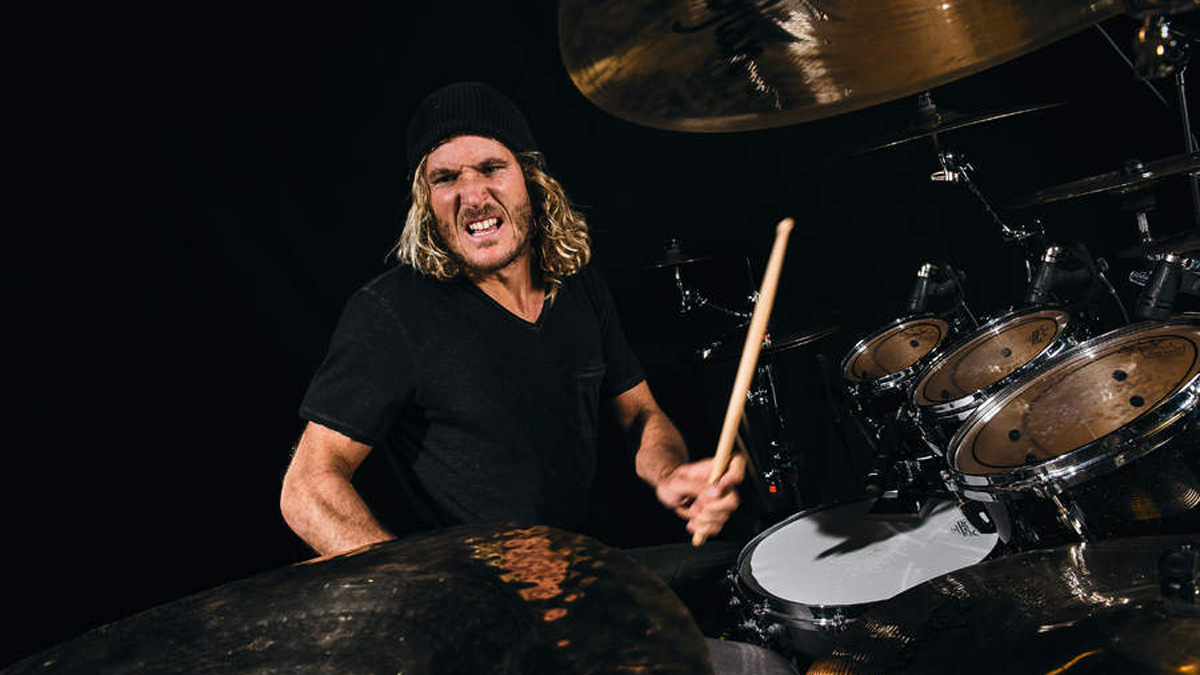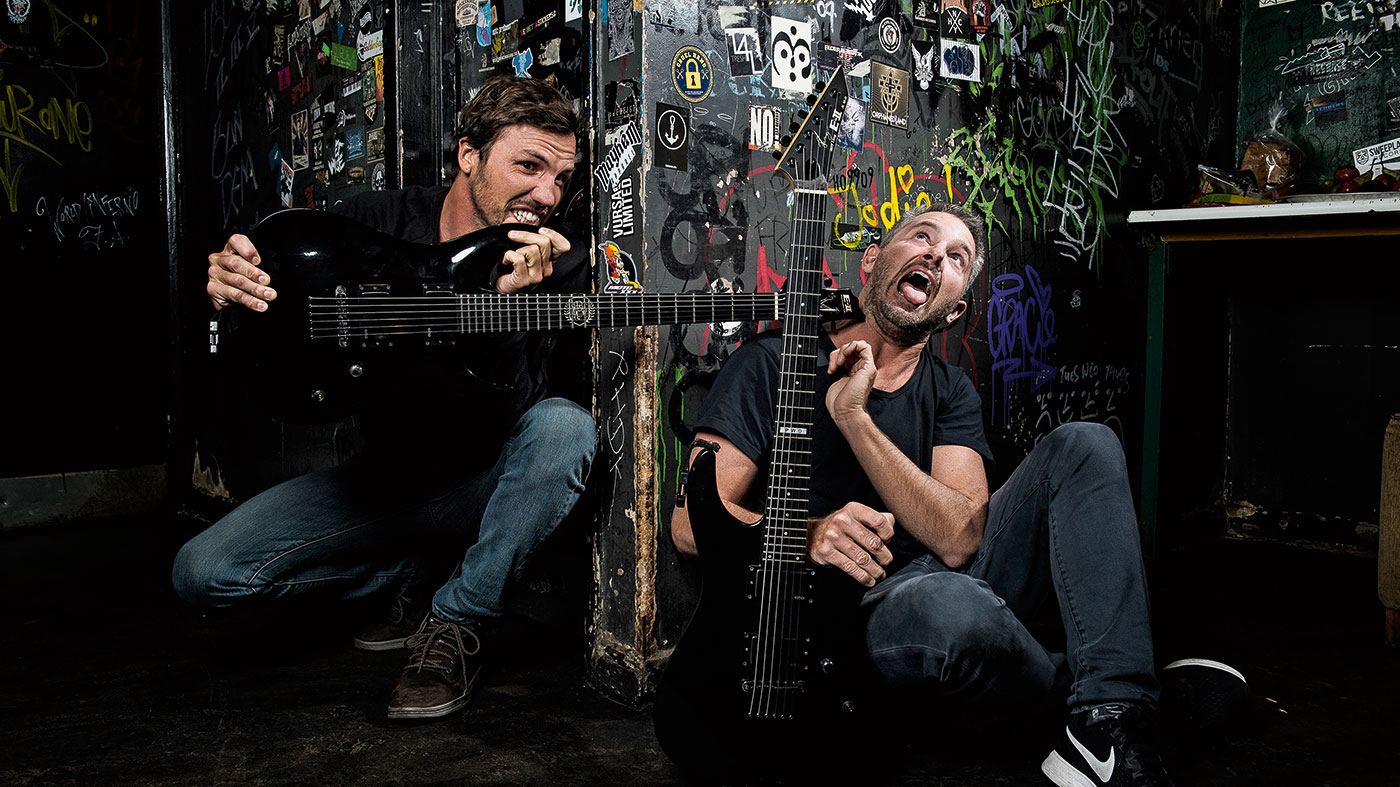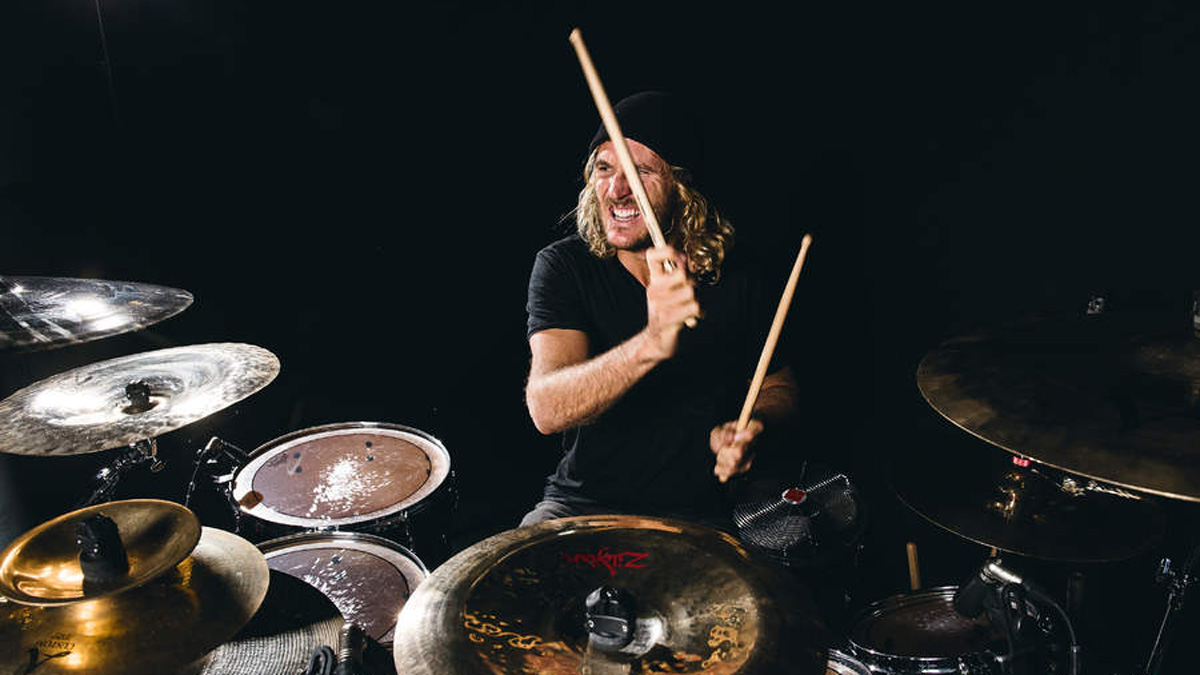Parkway Drive's Ben Gordon: "No one else in the band knows anything about drums"
Crafting the right grooves to get a festival crowd jumping, and learning to play upside down in the Cage Of Death…

From humble beginnings to the Cage of Death
When we meet Ben Gordon, it’s the afternoon before Australian metalcore kings Parkway Drive play a special one-off show in Camden’s The Underworld.
Although they’ve long outgrown the subterranean venue, it was their regular London haunt when they were first breaking out of Australia a decade earlier and so it still holds a special place in their hearts. Unsurprisingly, the show sold out in 20 minutes.
Both the drummer and the band hail from Byron Bay, New South Wales, not exactly a bustling metropolis of music. “Our town has so few people and our scene was so small, from the age of 13 I was the only drummer in town so I was in every band,” says Gordon, who tried drum lessons but couldn’t wait to get stuck in. “I just wanted to learn punk beats and play fast.”

Parkway Drive got together when Gordon was 16, he’s now 32, so he’s spent half his life playing and touring despite their initially modest goals. “We started the band so we could have our friends mosh to it. That was as far as our ambitions went,” he says. “We weren’t so much determined to make it, we just really liked touring, we liked driving around with our friends and seeing the world, we just wanted to keep doing it.”
Their persistence has paid off with five Australian gold albums to their name, and 2015’s Ire reaching Number 23 in the UK charts.
From your early days playing venues like The Underworld, you’re now festival headliners. Have the bigger venues changed your playing?
“Funnily enough, one of the things we’ve done as our venues have got bigger, is tailored our songwriting to that. Some of our older songs that are more thrashy work well in small clubs, but then when you play them to a festival or a large audience, they don’t go down as well.
"That’s why a lot of our newer songs are tailored for bigger shows, bigger festivals. The small singalongs and crowd participation parts that we’ve incorporated into newer songs really work live, so our singer can more or less control the crowd and people can have fun watching it.
“Ultimately, we’re a live band and that’s what we like doing. There is a difference between a good song and a good live song. It’s not rocket science, a lot of it in rock and metal really comes down to the beat and the tempo of the song. If it’s a tempo where you can comfortably bang your head or jump, then it’s a good song live.”
Would you say this has all fed into how you develop new drum parts?
“For sure. One of the biggest fundamental things we’ve learned is less is more. When we first started it would be full intensity on the drums, full intensity on the guitars all the time, which means Winston [McCall] had to be full intensity on the vocals all the time to get above us.
"It was just non-stop whereas we learned, hang on, if there’s a verse where there is singing, we’d better give some space. It’s about giving each other space at the right time. I have to simplify the drums, so it’s funny that people often comment that our older stuff was more technical, which it was, but it’s not because of a lack of skill, it’s more about the song now.
"Sometimes the song dictates simpler playing rather than, ‘Look how good I am, look what I can do.’ A drummer can ruin a song by trying to show off too much, so that’s what you learn when you grow up, basically.”
Where did you record drums for Reverence?
“Vancouver, Canada, in a studio called The Warehouse. It’s actually Bryan Adams’ studio. It’s a pretty incredible drum room, amazing records have come out of there and we’re pretty happy with the sound. Our producer really wanted to record there.”
Who was producer?
“It’s our sound guy, George Hadji-Christou. We’ve had this sound guy for the last 10 years on the road and for seven years he was saying, ‘I could do a better record than you’ve done.’
"We didn’t believe him and then one day we gave him a shot, recorded a demo, and ended up doing Ire. We were really happy with it, so we did it again with him for the new one.
"We’re definitely a live band and no one knows our live sound better than our live sound engineer, so it’s good because he can make our live sound as close to the record as anyone could.”
How do you track your drums?
“The rest of the band hate sitting in the studio listening to drums, so when we record drums I’m just by myself, which is great for me because I don’t have four other opinions speaking. I just do what I want.
"We do extensive pre-production beforehand in Australia, so all the songs were mapped out to tempo, all the scratch tracks were recorded. Then when I get over there it’s just me, the producer, engineer and the scratch track - it’s a good environment.
"No one else in the band knows anything about drums so it’s annoying when I do a fill or something and they’re like, ‘Do one that’s like, do-do-dat-dat-do, like this.’ I don’t know what they’re talking about.”
When I think of what I could be doing, lifting bricks or sitting in an office all day, this is not bad
Do you try to go for full takes?
“Definitely try to go for full takes. It’s pretty rare to get a full take flawlessly in the studio because you can play something live as good as you can play it and every night it’s fine, but the studio is that extra 10 percent.
"It needs to be perfect, so it’s really hard to get that studio-level take in one go. There are always punch-ins, but I try to be prepared and I’m good with the click these days so that’s never an issue. It’s hard though because you’re focusing on the spacing of a fill but then there’s also the velocity and hitting the centre of the drum, all those little technical aspects to nail in one go.
"We try to do it as real as possible because in a world where everyone is faking it and replacing sounds, we want to have something that sounds real and unique.”
How do you maintain your energy doing multiple takes in the studio?
“Our producers always push me to play hard in order to get the drums to translate, but a lot of it just comes down to physical fitness. I have to be fit and when we’re not touring I run and ride and exercise and train for that purpose. I’ve had experiences when we’re touring and after 10 shows in a row, I start to get fatigued, my legs aren’t working as well, and I’m playing sloppy.
"It’s not a good feeling going on stage being fatigued and not knowing if you’re going to play well. I’ve learned you’ve got to condition your body. I have an athletic approach more or less, eat well, sleep well, be fit, and that seems to work. We play an hour and 20 minutes and it’s similar to a marathon.
"You need to be fit to pull it off otherwise it’s not going to be good. Maybe they just didn’t play that well back then. My sister put a pedometer on my right leg once for a show.
"In an hour-long show, I did 9,500 kicks on my right leg, so probably about 15,000 for both legs, which, in an hour, is crazy. It goes to show how much energy it takes.”
Then you make life harder for yourself by hanging upside down in the Cage Of Death!
“We created this cage for a music video we did for the song Crushed because we wanted to create an effect of zero gravity. We mounted the camera on the cage while it spun and we had the idea, hang on, we could use this live. It has been done before, the king of that kind of thing is Tommy Lee, he’s been doing that since the 80s and he’s got the drum rollercoaster, and Slipknot has done it.
"The one we’ve got has never been done that exact way. Joey Jordison in Slipknot never went completely upside down - it tilted forward and rotated, but ours does a full barrel roll, 360 degrees. It’s funny though, probably three or four guys in the world have done it but still when we did it, half the comments were people saying, ‘Oh, they’re copying other people.’ Four people on earth have done it.
"What about the millions of people that have done LED screens or pyros? You always have those comments. That was a big challenge for me. I couldn’t actually practise before I left because it was in Europe, so I was just hanging upside down for five minutes at a time getting used to the blood rushing to my brain. It was difficult playing upside down but it was fun as well.”
It must affect everything, even how the beaters hit the bass drum?
“Yeah, the kicks are the hardest thing because upside down your arms can fight gravity, but your legs are a lot bigger and they hang down so you have to kick up. I wrote a drum solo, but when I got there I had to simplify it because I just couldn’t play it as well upside down.
"The hardest part was for our crew actually, because every single part of the drum kit had to be double-bolted down. The cymbals all had lock nuts, I was strapped in with two different safety devices and the crew had so much work to do and they pulled it off, to their credit.”

Hitting the road
What did you learn over the first five albums that informed your approach to Reverence?
“I think our sound has changed a bit on the last few records. Now we’ve got more of a bigger sound so we’re tuning down a bit and basically want a bigger, rockier sound to suit the more open spaces in our music now. Whereas, with our older songs with lots of blast beats, we wanted more of a high-tuned sound that would cut through. Everything we’ve done in our career, you’re learning.
"We’ve been together for 15 years now, we’re not a new band, 15 years no matter what profession you do is a pretty long time, so basically, I’ve learned a lot. As far as recording, it’s just a matter of being comfortable. If you’re good live, then you should be good in the studio. It’s really important to be good with a click. When we first started I didn’t play with a click, I was pretty terrible, I used to speed up and slow down.
"About seven or eight years into the band I had this realisation, this is my career now, we’re only growing, so I probably should learn the fundamentals. I had to go back and learn how to play with a click, learn how to do rudiments and fill in all the holes in my playing. It was pretty funny.”
Do you use a click live?
“Yeah. We’re starting to get pretty tight with Ableton Live. If you use any samples at all, which we do in some of our songs, you have to have a click. We don’t play our old songs to click but I prefer playing songs to a click now because you just don’t have to worry about it.
"We used to have a problem, like many, many metal and rock bands, of playing too fast. You know the tempo but when you get in front of thousands of people and your adrenaline is so high, your perception says, ‘This is the tempo,’ but you watch it back and you’re 10, 15 bpm faster and it doesn’t sound good.”
Do you have a particular vision of how you want to develop in the future?
“To be honest, my main focus is on Parkway at this stage. For a few years there, I was really focused on my drumming as a whole and I wanted to start doing clinics and things like that, but we’re just too busy now and the band takes up so much of my time.
"Really, I just want to get tighter live and condition myself more so I can play our set seamlessly. Then for future stuff, a lot of it is playing more classy rather than more technical. I find myself watching lots of YouTube videos of different jazz fills, different styles of music, and accents and dynamics.
“I feel like in my younger years I got as technical and as fast as I could really go. For metal, anything over about 220bpm just doesn’t sound good to me. It’s doesn’t sound musical, it just sounds like a show-off. I’m finding myself less and less into the constant double kick, which used to be all I was into.
"Now even for the old songs we play, I prefer to do better patterns and groovier patterns. Anyone can do constant double kick if you’re fit enough and have the muscle memory, but it takes actual skill to do syncopated rhythms and it takes creativity to come up with different patterns that sound good. That’s where I see my playing going.”
No one else in the band knows anything about drums so it’s annoying - they’re like, ‘Do one that’s like, do-do-dat-dat-do, like this.’ I don’t know what they’re talking about
Some bands regard touring as a chore to be endured, but not you guys?
“Our way of touring for most of our career, we’d bring our surfboards and go jump off bridges, find waterfalls, and explore - can’t do too much of that in England, but you can in America and Europe. We’ve been doing this for so long now it’s kind of worn off and now the gig really is the best part.
"It does get monotonous sometimes, it turns into a job sometimes, but the best thing to do is think, what’s the alternative? When I think of what all my friends are doing and what I could be doing, lifting bricks or painting all day, sitting in an office all day, this is not bad. It’s all about perspective.”
What impact has playing drums and being in a band had on you personally?
“It has transformed my life big-time. From the age of 16 I’ve been doing this, so it has literally shaped who I am as a person, and the experiences of seeing the world has really opened my eyes. In that sense it’s been everything and now fortunately, it’s just really fulfilling.
"Sometimes I sit on the beach in front of my house, look out, and think, ‘How the hell did this happen?’ Five guys from a little town in Australia and we’ve made a 15-year career out of a band that’s still growing and we’re still enjoying it. It’s just really fulfilling to be able to make music and tour around the world and be appreciated by people and live this lifestyle. I’m just grateful to be honest.”